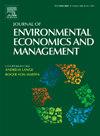Nature and the ultimate resource: Sustainability with poor input substitution
IF 5.9
3区 经济学
Q1 BUSINESS
Journal of Environmental Economics and Management
Pub Date : 2025-07-14
DOI:10.1016/j.jeem.2025.103209
引用次数: 0
Abstract
The paper develops an endogenous growth framework to show that poor input substitution and population growth are compatible with sustainable development, once labor and knowledge are adequately taken into account. A sustainable economy with poor input substitution relies on the combination of a favorable demand effect, providing a “safe haven" for capital and knowledge, and a supply effect that is supported by the “waterbed function" of labor. Population growth promotes sustainability through innovation, but has a negative impact if it implies increased pressure on ecosystem services. Induced innovation cannot avert an economic catastrophe when the ecology is tipping. Degrowth policies protect the environment but harm welfare level and development. Knowledge is the most important economic indicator of sustainability, but measurements at sectoral and country levels must be interpreted with great care.
自然和最终资源:投入替代不良的可持续性
本文发展了一个内生增长框架,表明一旦充分考虑劳动力和知识,投入替代和人口增长与可持续发展是相容的。投入替代较差的可持续经济依赖于为资本和知识提供“避风港”的有利需求效应和由劳动“水床功能”支撑的供给效应的结合。人口增长通过创新促进可持续性,但如果它意味着对生态系统服务的压力增加,则会产生负面影响。当生态崩溃时,诱导创新无法避免一场经济灾难。去增长政策保护了环境,但损害了福利水平和发展。知识是可持续性最重要的经济指标,但必须非常谨慎地解释部门和国家一级的衡量标准。
本文章由计算机程序翻译,如有差异,请以英文原文为准。
求助全文
约1分钟内获得全文
求助全文
来源期刊
CiteScore
8.00
自引率
4.30%
发文量
91
期刊介绍:
The Journal of Environmental Economics and Management publishes theoretical and empirical papers devoted to specific natural resources and environmental issues. For consideration, papers should (1) contain a substantial element embodying the linkage between economic systems and environmental and natural resources systems or (2) be of substantial importance in understanding the management and/or social control of the economy in its relations with the natural environment. Although the general orientation of the journal is toward economics, interdisciplinary papers by researchers in other fields of interest to resource and environmental economists will be welcomed.

 求助内容:
求助内容: 应助结果提醒方式:
应助结果提醒方式:


